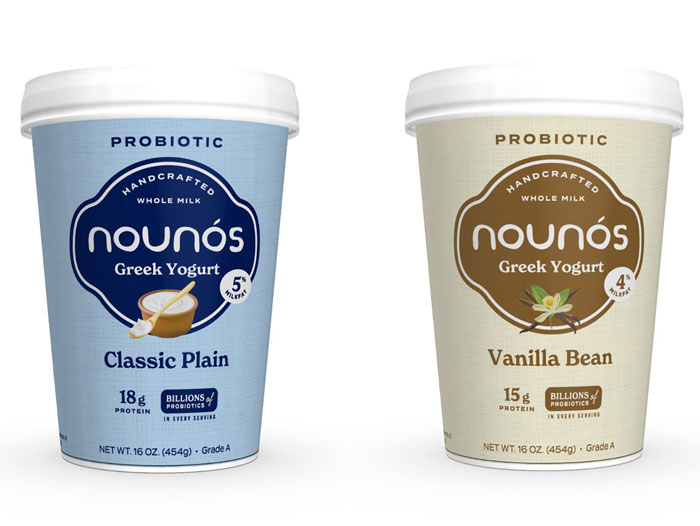Nounós Creamery Chooses Greiner Packaging’s Sustainable K3 Cup for its New Probiotic Strained Yogurt
February 29, 2024 | 3 min to read
Nounós Creamery, co-founded by Steven Ioannou and John Belesis, has embraced sustainability by using Greiner Packaging's K3® cardboard-plastic combination for their new probiotic strained yogurt. This innovative packaging reduces plastic use and ensures recyclability, aligning with consumer values. Nounós yogurt stands out for its health benefits, featuring 66% more protein and 30% less sugar, all while maintaining an authentic Greek flavor. Their commitment to sustainability enhances the product's appeal, contributing positively to the food industry.

Sustainable packaging choices
The cardboard wrap on Greiner Packaging’s innovative K3® cardboard-plastic combination provides stability, so the cup can be produced with particularly thin walls. By using less plastic than other solutions, it delivers a reduced CO2 footprint. The cup and wrap can be easily separated – which is important for recyclability. As the cup is always white or transparent, it produces high quality recyclates which are not contaminated by any inks.
“Right from the start, we chose to pack our single-serve naturally authentic yogurt in sustainable glass pots, which are loved by our consumers,” says John Belesis, co-founder of Nounós Creamery. “For the new launch of our 16oz probiotic strained yogurt, we have chosen Greiner Packaging’s sustainable K3® cardboard-plastic combination.”
“We wanted to add a probiotic variant and at the same time be able to offer a more accessible price point, while competing with other larger yogurt tubs commonly available in most retail locations. Choosing reclosable K3® was a major factor in the development of this new two-flavor range, as its 100% recyclability and premium look and feel fit so well with our and our consumers’ values.”
“Working with Greiner Packaging at its Pittston facility has enabled Nounós Creamery to diversify its portfolio and gain momentum in the competitive U.S. retail sector.”
The Nounós Creamery story so far
Having spent their summers and college years in the Mediterranean, Steven Ioannou and his Nounó (God Father), John Belesis, were dissatisfied with the ‘Greek-style’ yogurts available in the States. So, they began experimenting with their own handcrafted yogurt recipe.
As Greek yogurt slowly gained popularity in the U.S., these Greek-Americans couldn’t understand why all the so-called ‘Greek-style’ brands lacked the richness and flavor they knew and loved while growing up in Greece. Their search for authentic Greek yogurt grew into an obsession, and they returned to Greece to immerse themselves in learning the traditional, old-world craft of making yogurt or ‘Straggisto Yiaourti’.
With some ingenuity and a family recipe, the pair created Nounós Creamery and introduced bag-strained yogurt to New York in 2013. The thick, velvety rich, all natural yogurt quickly caught on and has become a food, fitness, and fashion lover’s favorite.
In January 2017, New York State certified the bag-strained yogurt to be sold outside of the region, and now yogurt lovers from California to Texas, Illinois to West Virginia, and beyond can enjoy the taste of real Greek yogurt.
What makes Nounós Creamery’s Greek yogurt different?
Nounós yogurt stands out in the crowded dairy market through its dedication to health, tradition, and sustainability, setting a new standard for what consumers can expect from their yogurt. At the heart of Nounós’ offerings is the belief in “Greek yogurt as thy medicine,” a mantra that reflects the brand’s commitment to providing a guilt-free indulgence.
By offering a nutrient-dense superfood that boasts 66% more protein and 30% less sugar than traditional yogurt, Nounós not only caters to the health-conscious consumer but also ensures that each spoonful is packed with more probiotics, thanks to their unique minimal cold strain and cold fill process. This approach not only enhances the yogurt’s nutritional profile but also its taste and texture, making it a superior choice for those looking to nourish their bodies without sacrificing flavor.
Nounós Creamery’s new probiotic strained yogurt is naturally packed with protein and billions of probiotics, including BB-12®. Available in classic plain and vanilla bean flavors, the new yogurt uses only natural, non-GMO ingredients, is hormone and antibiotic-free, gluten and rBST free, with no artificial flavors, colors, or preservatives.
Sustainability is another cornerstone of the Nounós brand. This move aligns with the growing consumer demand for sustainable products and showcases Nounós’ dedication to not just the quality of their yogurt, but also to the health of the planet. Nounós not only elevates the consumer experience but also contributes to a larger movement towards sustainability in the food industry, setting a powerful example for others to follow.
